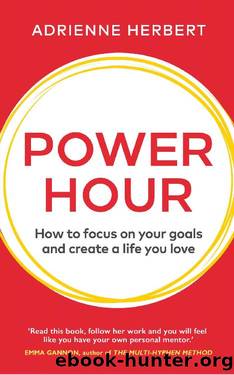Power Hour by Adrienne Herbert

Author:Adrienne Herbert [Herbert, Adrienne]
Language: eng
Format: epub
ISBN: 9781473585164
Publisher: Random House
Published: 2020-12-31T06:00:00+00:00
1. Create a calm and relaxing space to sleep.
Your bedroom should be a place that is quiet and free from distractions. Try to avoid clutter and mess in your room, and if possible avoid letting your work follow you into the bedroom. Itâs hard to switch off at the end of the day if you can still see visual reminders of your work projects, to-do lists, invoice statements and so on.
Invest in some low-watt lightbulbs or a lamp for your bedroom, and avoid bright lights after 8:00pm. Once youâre asleep, the room should be as dark as possible, as sleeping with even a small amount of light exposure impacts the quality of your sleep. The National Sleep Foundation recommends that we should: âShield artificial light properly in the bedroom (by turning your alarm so that the light faces away from you,11 for example), and use light at night only when itâs absolutely needed.â Iâve made my bedroom as dark as possible by investing in blackout blinds and making sure itâs a tech-free space. Once I turn out the light, I can barely see my hand in front of my face. Admittedly, this takes a bit of time to get used to, but it means that I sleep most nights for seven or eight hours without waking. Whenever I travel, I always place a piece of paper or a book in front of the hotel alarm-clock light, and I unplug the TV to remove that annoying red LED light. If you canât make your room dark enough, then maybe consider wearing an eye mask instead.
Add plants to your bedroom to evoke a sense of calm and tranquillity. Plants not only enhance the roomâs design, they can also improve your sleep. Some plants, such as ivy, are naturally air-purifying. Ivy is usually an outdoor plant, but when brought indoors it can drastically reduce the airborne mould in a room in just a few hours â great for allergy sufferers. I have ivy plants in my bedroom and my bathroom, and they are low-maintenance and pretty resilient (the goldfish of houseplants). Other plants such as the snake plant (sansevieria) will produce oxygen at night, which is considered to help promote sleep. Similarly, placing a lavender plant next to your bed, so you can inhale its calming scent, has been shown to reduce your blood pressure and heart rate. Personally, I use a deep-sleep pillow spray most nights before I go to bed. Itâs great for travelling too: no matter where I am in the world, as soon as I spray it Iâm reminded of my own bed. I recognise the smell, and associate it with sleep. It may be a placebo, but either way it smells good â so whatâs the harm?
Once youâve created a dreamy sleep haven, eliminate tech from your bedroom as much as possible. No TVs, laptops or phones allowed! Order an alarm clock online today for less than £10, instead of using your phone. (You can thank me later.)
Download
This site does not store any files on its server. We only index and link to content provided by other sites. Please contact the content providers to delete copyright contents if any and email us, we'll remove relevant links or contents immediately.
Zero to IPO: Over $1 Trillion of Actionable Advice from the World's Most Successful Entrepreneurs by Frederic Kerrest(4568)
Machine Learning at Scale with H2O by Gregory Keys | David Whiting(4313)
Never by Ken Follett(3955)
Harry Potter and the Goblet Of Fire by J.K. Rowling(3856)
Ogilvy on Advertising by David Ogilvy(3622)
Shadow of Night by Deborah Harkness(3367)
The Man Who Died Twice by Richard Osman(3077)
Book of Life by Deborah Harkness(2938)
The Tipping Point by Malcolm Gladwell(2921)
Will by Will Smith(2919)
Purple Hibiscus by Chimamanda Ngozi Adichie(2853)
0041152001443424520 .pdf by Unknown(2845)
My Brilliant Friend by Elena Ferrante(2831)
How Proust Can Change Your Life by Alain De Botton(2814)
How to Pay Zero Taxes, 2018 by Jeff A. Schnepper(2655)
Hooked: A Dark, Contemporary Romance (Never After Series) by Emily McIntire(2553)
Rationality by Steven Pinker(2363)
Can't Hurt Me: Master Your Mind and Defy the Odds - Clean Edition by David Goggins(2341)
Borders by unknow(2313)
